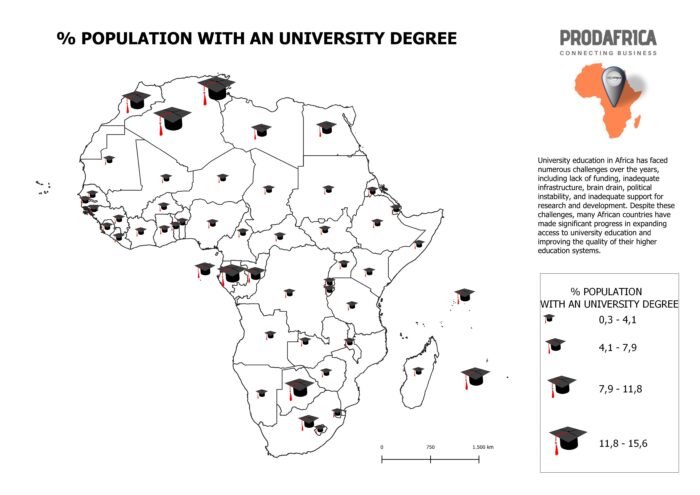University education in Africa has faced numerous challenges over the years, including lack of funding, inadequate infrastructure, brain drain, political instability, and inadequate support for research and development. Despite these challenges, many African countries have made significant progress in expanding access to university education and improving the quality of their higher education systems.
According to UNESCO, the gross enrollment ratio (GER) in tertiary education in sub-Saharan Africa has increased from 5% in 2000 to 8% in 2018. This increase is attributed to efforts by governments and other stakeholders to increase access to higher education, including expansion of university infrastructure, provision of scholarships and bursaries, and development of distance and online learning programs.
Table 1: Gross Enrollment Ratio in Tertiary Education in Africa
| Country | Gross Enrollment Ratio |
|---|---|
| Algeria | 32% |
| Angola | 8% |
| Benin | 3% |
| Botswana | 13% |
| Burkina Faso | 2% |
| Burundi | 1% |
| Cameroon | 7% |
| Cape Verde | 14% |
| Central African Rep. | 1% |
| Chad | 1% |
| Comoros | 3% |
| Congo, Dem. Rep. | 1% |
| Congo, Rep. | 9% |
| Cote d’Ivoire | 4% |
| Djibouti | 4% |
| Egypt | 35% |
| Equatorial Guinea | 2% |
| Eritrea | 1% |
| Ethiopia | 3% |
| Gabon | 18% |
| Gambia | 2% |
| Ghana | 15% |
| Guinea | 1% |
| Guinea-Bissau | 1% |
| Kenya | 8% |
| Lesotho | 7% |
| Liberia | 1% |
| Libya | 24% |
| Madagascar | 1% |
| Malawi | 1% |
| Mali | 2% |
| Mauritania | 2% |
| Mauritius | 22% |
| Morocco | 27% |
| Mozambique | 1% |
| Namibia | 18% |
| Niger | 1% |
| Nigeria | 6% |
| Rwanda | 3% |
| Sao Tome and Principe | 4% |
| Senegal | 10% |
| Seychelles | 14% |
| Sierra Leone | 1% |
| Somalia | – |
| South Africa | 19% |
| South Sudan | 1% |
| Sudan | 19% |
| Swaziland | 8% |
| Tanzania | 2% |
| Togo | 1% |
| Tunisia | 36% |
| Uganda | 5% |
| Zambia | 2% |
| Zimbabwe | 3% |
However, despite this progress, there are still significant disparities in access to university education across the continent. According to a report by the World Bank, the GER for tertiary education in North Africa was 34% in 2016, while in sub-Saharan Africa, it was only 9%. Additionally, there are significant disparities between urban and rural areas, with university education being more accessible in urban areas. This is due to the concentration of universities and higher education institutions in urban areas.
Furthermore, the quality of university education in Africa still remains a major challenge. Many universities struggle with inadequate infrastructure, outdated curricula, insufficient resources, and a lack of qualified faculty. This is compounded by the brain drain, where highly qualified academics leave the continent in search of better opportunities abroad.

Table 2: Top Universities in Africa (QS World University Rankings 2022)
| Rank | University | Country |
|---|---|---|
| 155 | University of Cape Town | South Africa |
| 170 | University of the Witwatersrand | South Africa |
| 201 | Stellenbosch University | South Africa |
| 217 | University of Johannesburg | South Africa |
| 235 | University of Pretoria | South Africa |
| 243 | American University in Cairo | Egypt |
| 263 | University of Ghana | Ghana |
| 264 | University of Nairobi | Kenya |
| 273 | Cairo University | Egypt |
| 274 | Ain Shams University | Egypt |
| 281 | University of Ibadan | Nigeria |
| 296 | Makerere University | Uganda |
| 315 | University of Dar es Salaam | Tanzania |
| 341 | Université Mohammed V de Rabat | Morocco |
| 352 | University of Marrakech Cadi Ayyad | Morocco |
| 367 | University of Nigeria, Nsukka | Nigeria |
| 370 | Université de Sfax | Tunisia |
| 378 | University of Zimbabwe | Zimbabwe |
| 382 | University of Tunis El Manar | Tunisia |
| 384 | Alexandria University | Egypt |
| 396 | University of Lagos | Nigeria |
| 402 | Université de Tunis | Tunisia |
| 406 | Université Cadi Ayyad Marrakech | Morocco |
Despite these challenges, many African countries have made efforts to improve the quality of their university education systems. Governments have increased funding for universities, and there have been significant efforts to develop and implement new curricula that align with current labor market demands.
Collaboration between African universities and universities from other parts of the world is essential for the development of higher education in Africa. This collaboration can take many forms, including research partnerships, faculty exchanges, and student exchanges. By collaborating with universities from other parts of the world, African universities can benefit from the expertise and resources of these institutions, and students can gain exposure to different cultures and academic traditions.
In recent years, there has been a growing trend towards internationalization in higher education, and many African universities have sought to establish partnerships with universities from Europe, Asia, and North America. These partnerships have resulted in joint research projects, joint degree programs, and faculty and student exchanges. For example, the Partnership for African Social and Governance Research (PASGR) is a collaboration between African universities and universities from Canada and Europe, which aims to strengthen social science research and training in Africa.
Student exchange programs are also an important aspect of international collaboration in higher education. These programs provide students with the opportunity to study abroad and gain exposure to different cultures and academic traditions. In addition to enhancing the academic experience, student exchange programs can also contribute to personal and professional development, and can help to build networks of international contacts.
Overall, international collaboration is an important aspect of higher education in Africa, and can contribute to the development of the continent. By collaborating with universities from other parts of the world, African universities can benefit from the expertise and resources of these institutions, and students can gain exposure to different cultures and academic traditions. As such, efforts to foster collaboration between African universities and universities from other parts of the world should be encouraged and supported.
While there have been significant strides in improving access to university education in Africa, there is still much work to be done. Governments and other stakeholders need to prioritize investment in higher education infrastructure, attract and retain qualified faculty, and develop and implement new curricula that are relevant to the needs of the continent. Only then can Africa’s university education systems play a transformative role in the development of the continent.
Sources:
- UNESCO Institute for Statistics. (2020). Education in Africa. Retrieved from https://uis.unesco.org/en/topic/education-africa
- World Bank. (2018). Africa’s Pulse. Retrieved from https://openknowledge.worldbank.org/handle/10986/30445
- QS World University Rankings. (2022). Top Universities in Africa 2022. Retrieved from https://www.topuniversities.com/university-rankings/world-university-rankings/2022

Team ProdAfrica
team@prodafrica.com